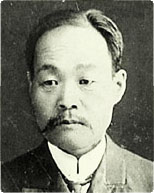Yu Gil-jun
| Yu Kil-chun | |
 |
|
| Korean name | |
|---|---|
| Hangul | 유길준 |
| Hanja | |
| Revised Romanization | Yu Giljun |
| McCune–Reischauer | Yu Kilchun |
| Pen name | |
| Hangul | 구당, 천민, 구일 |
| Hanja | , , |
| Revised Romanization | Gudang, Cheonmin, Guil |
| McCune–Reischauer | Kudang, Chŏnmin, Kuil |
| Courtesy name | |
| Hangul | 성무 |
| Hanja | |
| Revised Romanization | Seongmu |
| McCune–Reischauer | Sŏngmu |
Yu Kil-chun (1856–1914) was an intellectual, writer, politician and independence activist of Korea's late Joseon Dynasty. He was also the first modern Hangeul researcher and the author of a book of travel impressions: Seoyu gyeonmun (서유견문, ) ("Observations on Travels in the West"). This work included the important philosophical essay, "Levels of Enlightenment." He was cherished as the "ideal Korean patriot" by the independence activist Ahn Chang-ho.
Yu was born in Seoul, in modern-day South Korea. In his early years, he studied under Park Kyu-su and Oh Kyung-suk. In 1881 he went to Meiji Japan to matriculate at Keio University for a year, studying modernization from Fukuzawa Yukichi. In 1884, he traveled to the United States as part of the first official Korean delegation to observe American industry and government and studied at the Governor Dummer Academy.
Having travelled to several European countries, he was accused of supporting the Gaehwadang (개화당, , ‘enlightenment party'). In detention, he wrote a book on his experiences entitled Seoyu Gyeonmun (서유견문, ) ("Observations on Travels in the West"); in this book he used Korean mixed script as opposed to Literary Chinese, which was written using exclusively Chinese characters, and was the normal writing method of period literati-officialdom.
From 1894 to 1895, Yu worked for the government under Prime Minister Kim Hong-jip, who intended to modernize Korea. In 1895, he became Vice Minister of State for the Home Office. In October 1895, during the so-called Eulmi Sabyeon (을미사변, 乙未事變), the murder of Queen Min by Japanese soldiers, he was accused of co-operating with Japanese killers by Korea's King Gojong. Yu had previously written a letter describing Queen Min as ‘evil’; worse than Mary I of England and Marie Antoinette of France.
...
Wikipedia
